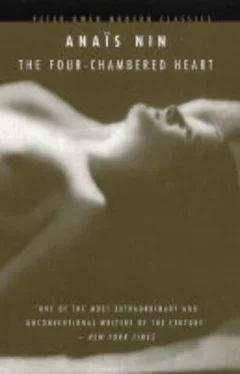Anaïs Nin - The Four-Chambered Heart
Здесь есть возможность читать онлайн «Anaïs Nin - The Four-Chambered Heart» весь текст электронной книги совершенно бесплатно (целиком полную версию без сокращений). В некоторых случаях можно слушать аудио, скачать через торрент в формате fb2 и присутствует краткое содержание. Год выпуска: 2004, ISBN: 2004, Издательство: Peter Owen Limited, Жанр: Классическая проза, Эротические любовные романы, на английском языке. Описание произведения, (предисловие) а так же отзывы посетителей доступны на портале библиотеки ЛибКат.
- Название:The Four-Chambered Heart
- Автор:
- Издательство:Peter Owen Limited
- Жанр:
- Год:2004
- ISBN:9780720611557
- Рейтинг книги:3 / 5. Голосов: 1
-
Избранное:Добавить в избранное
- Отзывы:
-
Ваша оценка:
- 60
- 1
- 2
- 3
- 4
- 5
The Four-Chambered Heart: краткое содержание, описание и аннотация
Предлагаем к чтению аннотацию, описание, краткое содержание или предисловие (зависит от того, что написал сам автор книги «The Four-Chambered Heart»). Если вы не нашли необходимую информацию о книге — напишите в комментариях, мы постараемся отыскать её.
The Four-Chambered Heart — читать онлайн бесплатно полную книгу (весь текст) целиком
Ниже представлен текст книги, разбитый по страницам. Система сохранения места последней прочитанной страницы, позволяет с удобством читать онлайн бесплатно книгу «The Four-Chambered Heart», без необходимости каждый раз заново искать на чём Вы остановились. Поставьте закладку, и сможете в любой момент перейти на страницу, на которой закончили чтение.
Интервал:
Закладка:
Rango brought her a tin cracker box which contained needles, threads, and buttons in boxes labeled with medicine names: injections, drops, pills.
The material Zora took up to sew looked like a rag. Her small hands smoothed it down mechanically, yet the more she smoothed it down the more it wilted in her hands, as if her touch were too anxious, too compressing, as if she transmitted to objects some obnoxious withering breath from her sick flesh.
And when she began to sew she sewed with small stitches, closely overlapping, so closely that it was as if she were strangling the last breath of color and life in the rag, as if she were sewing it to the point of suffocation.
As they talked she completed the square she had already begun, and then Djuna watched her rip apart her labor and quietly begin again.
“Djuna, I don’t know if Rango told you, but Rango and I are like brother and sister. Our physical life…was over years ago. It was never very important. I knew that sooner or later he would love another woman, and I am glad it’s you because you’re kind, and you will not take him away from me. I need him.”
“I hope we can be…kind to each other, Zora. It’s a difficult situation.”
“Rango told me that you never tried, or even mentioned, his leaving me. How could I not like you? You saved my life. When you came I was about to die for lack of care and food. I don’t love Rango as a man. To me he is a child. He has done me so much harm. He just likes to drink, and talk, and be with friends. If you love him, I am glad, because of the kind of woman you are, because you are full of quality.”
“You’re very generous, Zora.”
Zora leaned over to whisper now: “Rango is mad, you know. He may not seem so to you because he is leaning on you. But if it were not for you I would be out in the street, homeless. We’ve often been homeless, and I’d be sitting on my valises, out on the sidewalk, and Rango just waving his arms and helpless, never knowing what to do. He lets everything terrible happen, and then he says: ‘It’s destiny.’ With his cigarette he set fire to our apartment. He was nearly burnt to death.”
There was a book lying at the foot of her bed, and Djuna opened it while Zora was carefully unstitching all she had sewed before.
“It’s a book about illness,” said Zora. “I love to read about illness. I go to the library and look up descriptions of the symptoms I have. I’ve marked all the pages which apply to me. Just look at all these markings. Sometimes I think I have all the sicknesses one can have!” She laughed. Then looking at Djuna plaintively, almost pleadingly, she said: “All my hair is falling out.”
When Djuna left that evening, Rango and she were no longer man and woman in a chamber of isolated love for each other. They were suddenly a trinity, with Zora’s inexorable needs conducting all their movements, directing their time together, dictating the hours of separation.
Rango had placed Zora under Djuna’s protection and her love for Rango had to extend in magnitude to include Zora.
Zora talked to Djuna. If it was Djuna who had planned to come to Zora and show the most exemplary devotion, she found herself merely passive before the friendliness of Zora.
It was Zora who talked, with her eyes upon her sewing and unsewing. “Rango is a changed man, and I’m so happy, Djuna. He is kinder to me. He was very unhappy before and he took it out on me. A man cannot live without love and Rango was not easy to satisfy. All the women wanted him, but he would see them once perhaps and come back dejected, and refuse to see them again. He always found something wrong with them. With you he is content. And I am happy because I knew this had to happen sometime, but I’m happy it’s you because I trust you. I used to fear some woman coming and taking him where I would never see him again. And I know you wouldn’t do that.”
Djuna thought: “I love Rango so much that I want to share his burdens, love and serve what he loves and serves, share his conviction that Zora is an innocent victim of life, worthy of all sacrifices.”
This was for both Rango and Djuna the atonement for the marvelous hours in the barge. All great flights away from life land one in such places of atonement as this room, with Zora sewing rags and talking about dandruff, about ovarian insufficiency, about gastritis, about thyroid and neuritis.
Djuna had brought her a colorful Indian-print dress and Zora had dyed it black. And now she was reshaping it and it looked worn and dismal already. She wore a shawl pinned with a brooch which had once held stones in its clasps and was now empty, thrusting bare silver branches out like the very symbol of denudation. She wore two overcoats sewn together, the inner one showing at the edges.
While they sat sewing together, Zora lamented over Rango: “Why must he always live with so many people around him?”
Knowing that Rango liked to spend hours and hours alone with her, Djuna feared to say: “Perhaps he is just seeking warmth and forgetfulness, running away from illness and darkness.”
When Rango was with her he seemed dominating, full of dignity and pride. When he entered Zora’s room he seemed to shrink. When he first entered there was a copper glow in his face; after a moment the glow vanished.
“Why do men live in shoals?” persisted Zora.
Djuna looked at Rango lighting the fire, warming water, starting to cook. There was something so discouraged in the pose of his body, expressing agreement with Zora’s enumeration of his faults, so diminished, which Djuna could not bear to witness.
Zora was in the hospital.
Djuna was cooking for Rango now, edges.
As Djuna passed through the various rooms to find Zora she saw a woman sitting up in bed combing her hair and tying a blue ribbon around it. Her face was utterly wasted, and yet she had powdered it, and rouged her lips, and there was on it not only the smile of a woman dying but also the smile of a woman who wanted to die with grace, deploying her last flare of feminine coquetry for her interview with death.
Djuna was moved by this courage, the courage to meet death with one’s hair combed, and this gentle smile issuing from centuries of conviction that a woman must be pleasing to all eyes, even to the eyes of death.
When she reached Zora’s bed she was faced with the very opposite, an utter absence of courage, although Zora was less ill than the other woman.
“The soup is not thin enough,” said Zora. “It should have been strained longer.” And she laid it aside and shook her head while Djuna and Rango pleaded that she should eat it anyway for the sake of gaining strength.
Her refusal to eat caused Rango anxiety, and Zora watched this anxiety on his face and savored it.
He had brought her a special bread, but it was not the one she wanted.
Djuna had brought her some liver concentrate in glass containers. Zora looked at them and said: “They are not good. They’re too dark. I’m sure they’re not fresh and they will poison me.”
“But Zora, the date is printed on the box, the drugstore can’t sell them when they’re old.”
“They’re very old, I can see it. Rango, I want you to get me some others at La Muette drugstore.”
La Muette was one hour away. Rango left on his errand and Djuna took the medicine away.
When they met in the evening Rango said: “Give me the liver medicine. I’ll take it back to the drugstore.”
They walked to the drugstore together. The druggist was incensed and pointed to the recent date on the box.
What amazed Djuna was not that Zora should give way to a sick woman’s whims, but that Rango should be so utterly convinced of their rationality.
The druggist would not take it back.
Rango was angry and tumultuous, but Djuna was rebelling against Rango’s blindness and when they returned to the houseboat she opened one of the containers and before Rango’s eyes she swallowed it.
Читать дальшеИнтервал:
Закладка:
Похожие книги на «The Four-Chambered Heart»
Представляем Вашему вниманию похожие книги на «The Four-Chambered Heart» списком для выбора. Мы отобрали схожую по названию и смыслу литературу в надежде предоставить читателям больше вариантов отыскать новые, интересные, ещё непрочитанные произведения.
Обсуждение, отзывы о книге «The Four-Chambered Heart» и просто собственные мнения читателей. Оставьте ваши комментарии, напишите, что Вы думаете о произведении, его смысле или главных героях. Укажите что конкретно понравилось, а что нет, и почему Вы так считаете.












